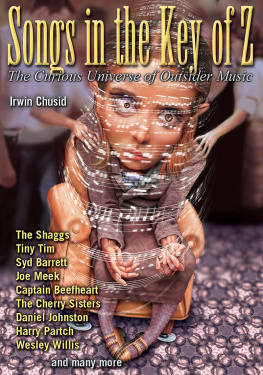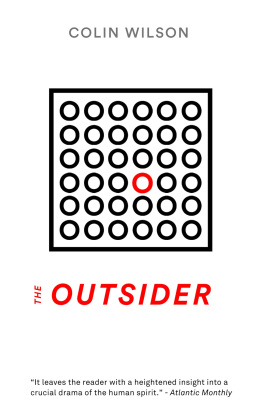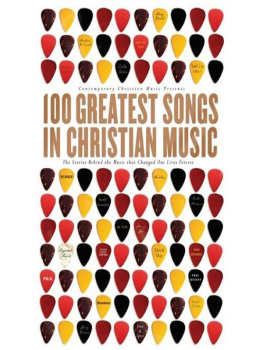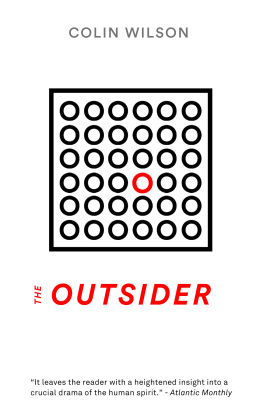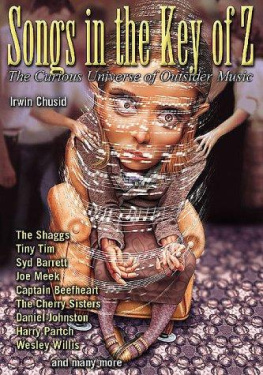
Library of Congress Cataloging-in-Publication Data
Chusid, Irwin.
Songs in the key of Z : the curious world of outsider music / Irwin Chusid.
p. cm.
Includes bibliographical references, discography, and index.
ISBN 1-55652-372-6
1. MusiciansBiography. 2. Popular musicHistory and criticism. I. Title.
ML394.C56 2000
781.6409dc21
99-057640
Interior design: Lindgren/Fuller Design
Cover design: Greg Carter
2000 by Irwin Chusid
All rights reserved
First edition
Published by A Cappella Books,
an imprint of Chicago Review Press, Incorporated
814 North Franklin Street
Chicago, Illinois 60610
ISBN 1-55652-372-6
Printed in the United States
5 4 3 2 1
Dedicated to Mencken, Mary, and Mr. Mack

CONTENTS

INTRODUCTION
Folklore is the arts of the people before they find out there is any such thing as art.
ZORA NEALE HURSTON
genius? Forget it. Talent? Beside the point.
Welcome to the curious universe of outsider music, a mutant strain of twisted sonic art thats so wrongits right.
Duke Ellington once said, If it sounds good, it is good.
Well, sometimes if it sounds bad, its even better.
Most people recognize good music when they hear it. Music that succeeds in the broader marketcall it popularadheres to commonly accepted standards of melody, harmony, and tonal logic. Rhythm is fairly consistent, and lyrics tend to addressprofoundly or vapidlyour shared culture and experiences.
Occasionally popular music cleverly challenges or plays footloose with convention. But for the most part, basic formulas remain intact. There is right, and there is wrong, and producers, record execs, and radio programmers are paid obscene sums to determine what the market will accommodate. In an age of multitrack overdubbing and digital splicing, any performance miscue can be repaired. And though producers can work with serendipitous mistakes, even make them sound intentional, most studio professionals prefer to re-take a bum note or blown chord until done correctly.
Now, imagine a musical universe where such standards do not exist, where keys beyond G are explored with lan. This book is a pan-galactic map of crackpot and visionary music, where all trails lead essentially one place: over the edge. Picture a musical subclass glimpsed through the lens of Diane Arbus.
This book is about artists who are instinctively gifted with what might be termed imperfect pitch.
Outsider music sometimes develops naturally. In other cases, it could be the product of damaged DNA, psychotic seizures, or alien abduction. Perhaps medical malpractice, incarceration, or simple drug-fry triggers its evolution. Maybe shrapnel in the head. Possession by the devilor submission to Jesus. Chalk it up to communal upbringing or bad beer. Theres no universal formula.
Thats one characteristic that makes outsider music so refreshing: its unpredictability.
Adventuresome musicians have been known to deliberatelyeven maliciouslyjettison traditional approaches to expand the boundaries of music. Way beyond the parameters of pop stood renegade composer-theorist John Cage (19121992), considered by many the most avant of all gardes. Cage studied under twelve-tone formulator Arnold Schoenberg, who insisted, In order to write music, you must have a feeling for harmony. Cage lamented, I had no feeling for harmony. [Schoenberg] then said that I would always encounter an obstacle, that it would be as though I came to a wall through which I could not pass. I said, In that case I will devote my life to beating my head against that wall. Cage proceeded to create a unique body of work that remains among the most influential of the twentieth centuryand not everyone calls it music. But no one doubted that he was in command of his mental faculties. Cage made a conscious choice to rebel, and regardless of the theoretical randomness of his aleatory (chance) music, he maintained control over his work.
But there are countless unintentional renegades, performers who lack Cages overt self-consciousness about their art. As far as theyre concerned, what theyre doing is normal. And despite paltry incomes and dismal record sales, theyre happy to be in the same line of work as Celine Dion and Andrew Lloyd Webber.
These artists populate the curious universe of outsider music. Lucrative careers in show biz are largely beyond their grasp, yet these quirky characters are compelled to create music, and public indifference is no deterrent. They orbit beyond the databanks of SoundScan and focus group surveys. They get little or no commercial radio exposure, their followings are limited, and they have roughly the same likelihood of attaining mainstream success that a possum has of skittering safely across a six-lane freeway.
The average person hearing outsider-type musicians for the first time might conclude that their performances are inept, or that these artists lack talent. Their vocals sound melodically adrift; their rhythms stumble. They seem harmonically without anchor. Their instrumental proficiency may come across as laughably incompetent.
A common first reaction to the Shaggs landmark album Philosophy of the World is, What were they thinking? After witnessing a performance by the Legendary Stardust Cowboy, a club owner sneered, That is the worst shit Ive ever heard in my life. And a radio station director once remarked that Harry Partch would be a really good composer if only hed compose regular music.
Such reactions presuppose that these artists are attempting to meet conventional standards of musicianship, but are failing miserably.
To appreciate outsider music, however, an accommodation is required on the part of the listener. The rewards are ample: just when you think youve heard it all, outsider music reveals vistas you never imagined existed. Outsider music is created to entertain, and does entertain at levels that exceed the indifference it might engender if it displayed greater technical ability and self-awareness. The wronger it is, particularly with lesser degrees of self-conscious intent, the closer it approaches pure originality.
Millions of songs are written every decade, most of which flawlessly comply with the rudiments. The bulk of such work is bloodless, soulless, and academic. Obeying rules is hardly a benchmark of creativity, much less of that elusive quality we recognize as genius. As some wag observed, The angels love enthusiasm far more than perfection.
Long before the world knew him as the father of the Simpsons, Matt Groening was collecting weird sonics and writing about them as a critic. Im less interested in virtuosity than I am in the passion with which an album is performed, he explained. Thats why I love eccentrics like the Shaggs, Daniel Johnston, and Luie Luie.
Its undeniable that, on first listening, theres often a measure of comedic value to some of these artists. But inevitably theres a je ne sais quoi that transcends laughter. Each of these artists, regardless of accessibility, has a singular identity and a recognizable style.
New York saxophonist Ellery Eskelin, whose father Rodd Keith toiled in the conveyor-belt your-lyrics-put-to-music industry (song poems), declared, I find that outsider music offers many of the same rewards in terms of satisfying the human spirit as does music traditionally regarded as being the best we humans have to offer. Its often inventive, certainly unique, and once you get past the humor factor, theres something there in terms of structure or melodic twist, issues that are purely musical, that I find very engaging.
Next page
